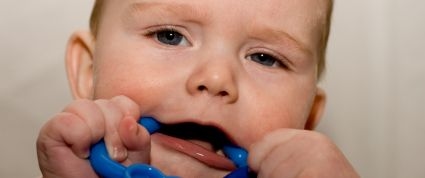
How will you recognize the signs that your baby is cutting his or her primary teeth (the first 20 teeth)? And, how will you ease the discomforts that come with teething – for your little one and you?
Know the Timing for Teething
You’ve probably heard that primary teeth can start developing as early as when your baby is in the womb. Most likely, none of your baby’s teeth will erupt until he or she is about six months old. Every child is different, though, and so the time when teething begins can vary. Some start teething as early as three months while others begin as late as one year!
Be on the lookout for little white nubs that poke out of the bottom gums (those are the first teeth to appear, usually). Soon, two front teeth will follow these on the upper gums.
Ways to Spot Teething Symptoms
Now that you know when and where primary teeth may come in, stay on the lookout for these signs of teething:
Excess dribbling of saliva (drooling)
Gum redness in a place where a new tooth is growing
Flushed cheeks
Extra fussiness or fretting (often, when feeding)
Trying to chew on things
How to Soothe a Teething Baby
When your baby starts teething, try offering a teething ring. (Mayo Clinic recommends the kind made of firm rubber.) It helps to put the ring in the refrigerator for a little while—the cool temperature of the ring will help soothe the baby’s aching gums.
Gently massage your baby’s gums. First, be sure your hands are washed completely clean, and then use a clean, moistened baby washcloth to rub your child’s gums. It’s better if it’s cool (but not extremely cold) since this also helps to soothe the baby.
Be sure to blot off the dribble. When your baby is drooling as a result of teething, keep a washcloth close by to dry off the area around his or her mouth and chin. This will help prevent chapping and irritation.
Try Infants’ Tylenol® or ibuprofen. Check with your pediatrician first, but it may be useful to try these over-the-counter pain medications to help calm a very fussy teether. Stay away from teething medications that include the ingredient “benzocaine.” This is a topical or local anesthetic that has been associated with a very rare but serious health condition that lowers the blood’s oxygen level.
Many adults wonder whether teething can cause fever or diarrhea in their babies. To date, studies have not shown a definite association between the two. If your baby has these other symptoms, it is likely that something else is the cause.
